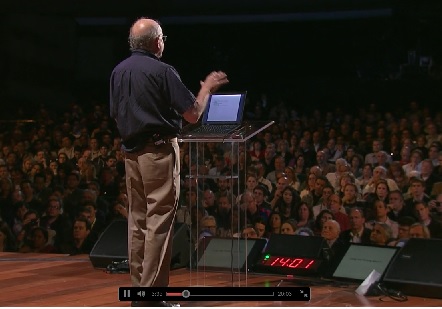I had seen the name “Daniel Kahneman” via TED some time ago, though knew little about him or his work. I then saw a handful of retweets signposting a Guardian interview with Kahneman and clicked through. Perked by the Guardian article I bumbled around internet reading and watching Kahneman content. There was certainly not a shortage of it.
Clearly an eminent man and sought after speaker (see the packed TED2010 auditorium, a talk just shy of 3 million views) I quickly realised that Kahneman was in fact a research giant and that I was reading about “world’s most influential living psychologist.” Well ahead on the happiness research curve (again see TED2010), his seminal work on challenging the rational model of judgment and exploring the irrational ways we make decisions about risk definitely has implications for the education arena.
Judgement and snippets from various online Kahneman articles and videos for you to consider… slowly.
Kahneman on Thinking
Many of us who study the subject think that there are two thinking systems, which actually have two very different characteristics. You can call them intuition and reasoning, although some of us label them System 1 and System 2. There are some thoughts that come to mind on their own; most thinking is really like that, most of the time. That’s System 1. It’s not like we’re on automatic pilot, but we respond to the world in ways that we’re not conscious of, that we don’t control. The operations of
System 1 are fast, effortless, associative, and often emotionally charged; they’re also governed by habit, so they’re difficult either to modify or to control.There is another system, System 2, which is the reasoning system. It’s conscious, it’s deliberate; it’s slower, serial, effortful, and deliberately controlled, but it can follow rules. The difference in effort provides the most useful indicator of whether a given mental process should be assigned to System 1 or System 2.
I wonder if teaching fails to recognise the value of System 1 as these qualities are almost impossible to exam and fails to fully exploit System 2 as we are all to often in a hurry to cover the content?
Kahneman on Leaders –
We have a special taste in leaders. I think that, by and large, people like leaders who are very decisive and quick and not too deliberative, not too slow. We like people to be optimistic, and we like them to be confident.
The idea of leadership that admittedly doesn’t know what it’s doing, you don’t want that.
Kahneman on Meetings (one idea I will definitely explore) –
Meetings should start with participants writing down their ideas about the issue at hand before anyone speaks. That way, the halo effect – whereby the concerns raised first and most assertively dominate the discussion – can be mitigated, and a range of views considered.
Kahneman on Culture –
Mood is noxious. Noise is costly to organisations, which are essentially factories for making decisions.
Kahneman on Self-improvement –
If I had one wish, it is to see organizations dedicating some effort to study their own decision processes and their own mistakes, and to keep track so as to learn from those mistakes. I think this isn’t happening. I can see a lot of factors acting against the possibility of that happening. But if I had to pick one thing, that would be it.
How would education policy stand up to that assessment? How would schools stand up?
On work-life balance, Kahneman’s words echo the sentiment and self-reflection’s of John Tomsett.
One of them is, we do tend to neglect our Experiencing Self. I think we do too much to build up a resume, and I don’t mean that in a narrow way. The resume, what I mean by that, is each of us has a story, has a narrative; the narrative of our life. It’s our prized possession and we do a lot to keep it looking good. We may be doing too much for it.
There is also a matter of living, of living your life. There are decisions that you might make differently. For example, in the life-work balance, there are decisions you might make differently if you are thinking of the Experiencing Self and not only of accomplishments and goals, and things like that.
If you are interested – Thinking, Fast and Slow: Daniel Kahneman.
[qr_code_display]


